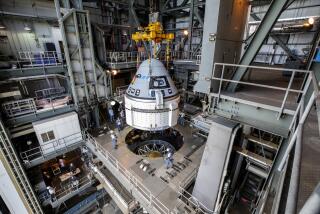Four Break Silence on Accident : Astronauts Weren’t Told of Rocket Seal Problems
HOUSTON — Four senior space shuttle commanders said Monday that astronauts were never told of a series of problems with seals on the spacecraft’s solid rocket boosters, even though engineers had been concerned about the seals for more than two years.
One of the astronauts, Henry W. Hartsfield, said he was angry that he was not informed of the malfunctioning seals, considered the prime suspect in the Jan. 28 destruction of the shuttle Challenger, until after the investigation of the explosion began.
Two of the four astronauts who spoke at Johnson Space Center on Monday flew missions during which the seals were damaged, but did not learn about those events until testimony began before the presidential commission studying the cause of the accident.
‘Surprised and Angry’
“I personally was very upset to find out we had a problem with the solid rocket booster seals and we didn’t know that until the accident,” said Hartsfield, who learned that seals were damaged on two of the three missions he has flown. “I was surprised and angry I didn’t know this.
“If we don’t make something better out of this, we’re missing a safe bet. I think my friends who died would want us to be better for it.”
No astronauts were informed of problems with the seals, known as O-rings. Testimony in Washington revealed at least seven previous instances in which the seals were damaged. The discoveries were made when the reusable rockets were disassembled after being recovered from the Atlantic. Hartsfield said that even if the faulty seals were not the main cause of the shuttle crash, they must be improved.
“If what I understand about the seals is correct, I would not want to fly again until they fix the seals,” he said.
The National Aeronautics and Space Administration arranged for the four astronauts to be interviewed, breaking the official silence of the astronaut corps since the Challenger accident, in which seven crew members were killed 73 seconds after liftoff.
Joe Engle, the other astronaut to fly a mission that sustained seal damage, said he was not angry that he had not been informed, but added that he wished the problem with the seals had been “more visible to the decision-making process.”
Withholds Judgment
He, like the other astronauts, said he did not want to pass judgment before the commission, headed by former Secretary of State William P. Rogers, reached its conclusions on the cause of the crash. All four declined to endorse Rogers’ criticism of the NASA decision-making process as “clearly flawed.”
A third astronaut, Vance D. Brand, agreed that the astronauts should have been informed about the booster seals.
“This one just slipped by us,” he said. “I think it’s something we should have been informed about because it had safety-in-flight implications. It’s not that we could have changed things, but if you’re going to fly it, you like to know about it.”
The fourth astronaut, Charles G. Fullerton, said his trust in the NASA system would depend on what is done to improve it. He also said there is no way that astronauts can be involved in every phase of a mission.
Pressure to Launch Denied
All four said they had never felt any undue pressure to hurry a launch.
Engle said the main goal of NASA and the commission should be to locate the cause of the crash, then get the shuttle in the air again. He said the shuttle program had given the country a sense of pride and that Americans should not “curl up their tails and hide in a corner. I’m not curling up my tail.”
Hartsfield had much the same feeling. “I think we all have the same attitude--let’s get the investigation over and get on with it.”
More to Read
Sign up for Essential California
The most important California stories and recommendations in your inbox every morning.
You may occasionally receive promotional content from the Los Angeles Times.










